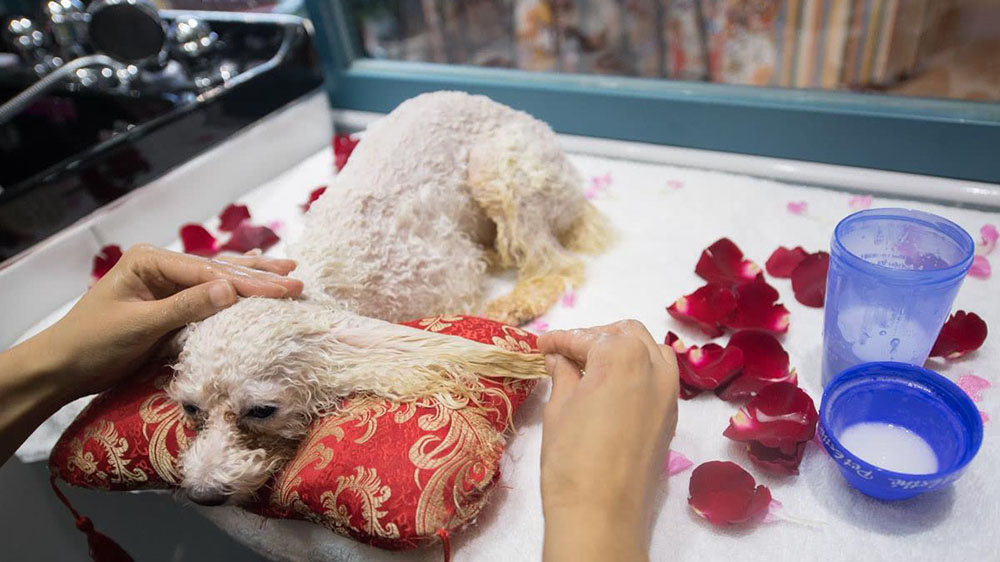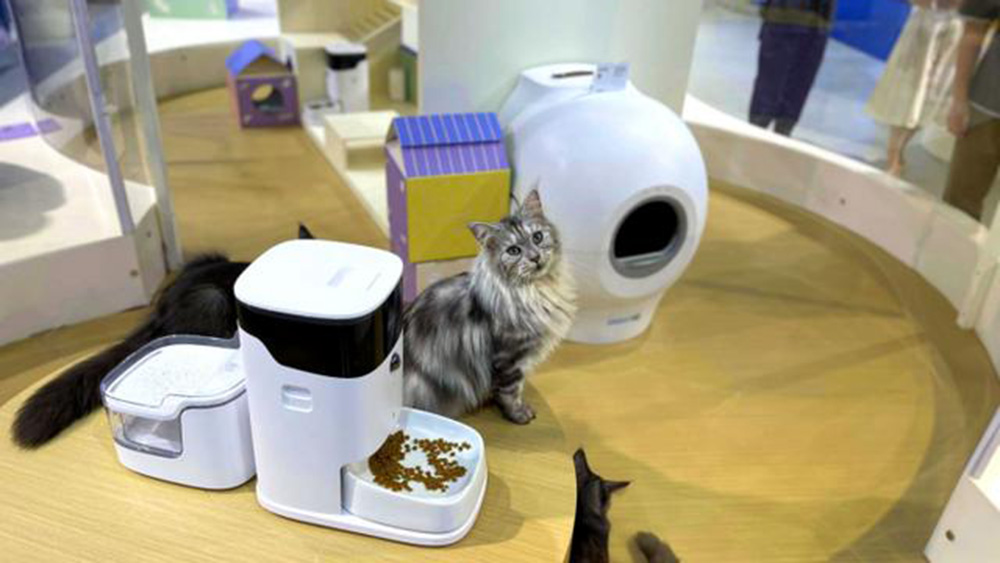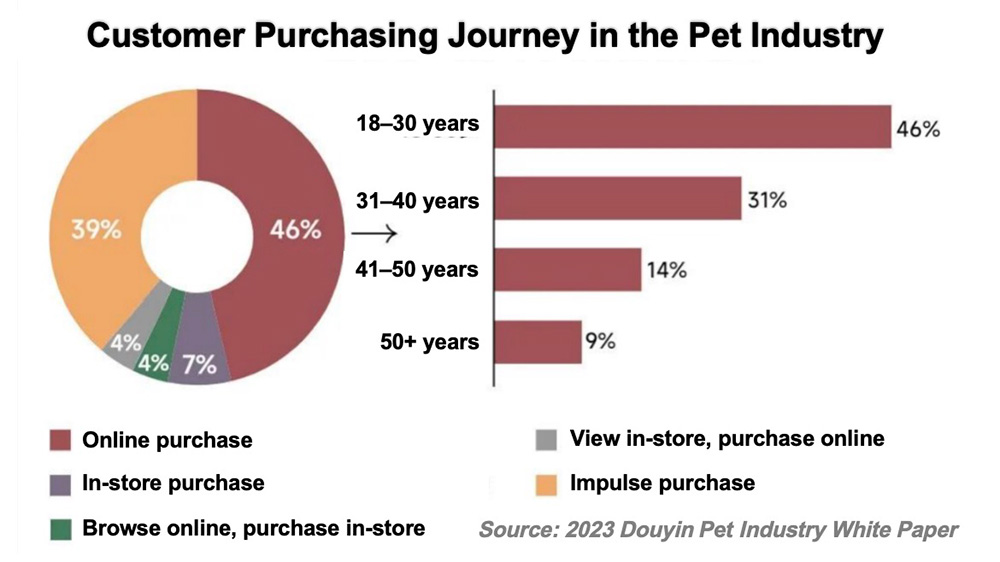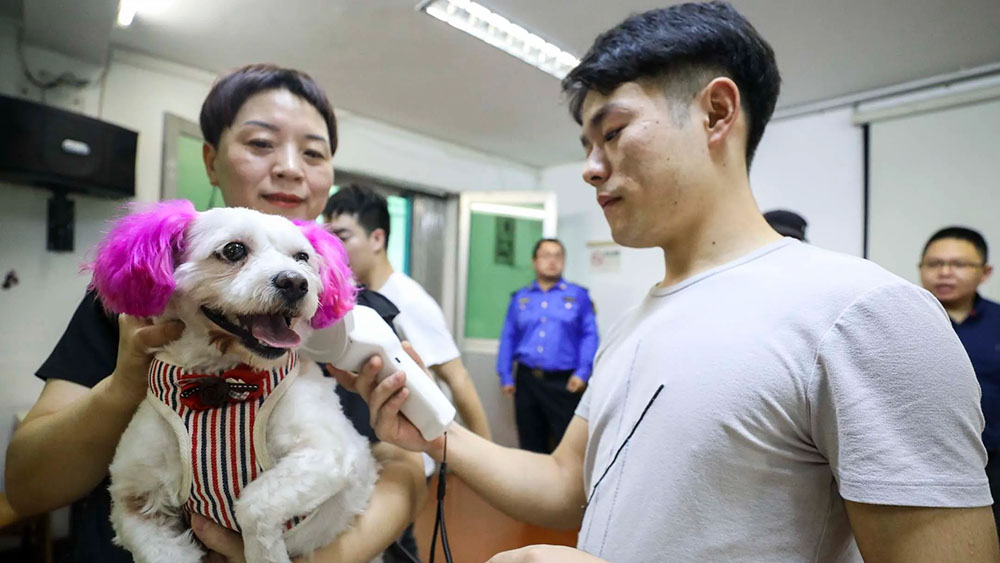Despite the economic slowdown, China’s luxury pet industry is thriving. Entrepreneurs are seizing the opportunity, offering innovative products and services to meet the growing demand for high-end pet care. How is the pet industry capitalising on people’s desire to spend lavishly on their pets, and what does it reveal about conspicuous consumption and China’s unique model of entrepreneurial capitalism?
On a quiet morning in Chengdu, Ms Zhou Yiru is organising goods in her warehouse, preparing a beautifully crafted outfit to be collected by a customer waiting outside her high-end pet boutique.

Mr Huang Zhibo, standing outside the shop, is holding his cat Tiger in a stylish backpack. Today, he is collecting a custom-made outfit for Tiger, which costs 800 RMB (about £86). “Tiger is part of my family, so he deserves the best,” Mr Huang says with a smile.
Scenes like this are becoming increasingly common in Chinese cities, where pet owners are spending more on gourmet pet food, luxury grooming services, and more. Ms Zhou’s boutique offers everything from organic pet food to custom accessories, epitomising the thriving industry. “Even with the economic slowdown, we’ve seen a significant increase in demand,” Ms Zhou says. “People may cut back on other expenses, but spending on pets remains largely unaffected.”
Despite economic challenges, China’s pet industry is growing rapidly. According to a 2022 report from the China Industrial Research Institute, the pet industry grew by 25% to become a trillion-yuan market, even as other sectors slowed or contracted. This growth reflects the rise of conspicuous consumption within China’s middle class, with pets becoming symbols of status and success.
Entrepreneurs like Ms Zhou are tapping into this trend by offering high-end services and products tailored to consumer needs. “The pet market is highly competitive, but for those who understand consumer demand, it’s full of opportunities,” says pet industry professional Wang Yue. “The demand for luxury pet care isn’t just about love for animals; it’s also driven by a desire to project a certain image and lifestyle.”
This shift in consumption habits is not limited to pet owners but reflects broader changes in how wealth is expressed in China. In the past, conspicuous consumption was mainly focused on luxury cars and designer clothing, but now it extends to how pets are cared for and treated. As pet ownership becomes a marker of wealth, the industry is responding with an increasing number of innovative products and services.

To capitalise on this trend, entrepreneurs across China are finding new ways to meet the needs of pet owners. In Chongqing, Ms Jin Ming runs a pet spa offering everything from aromatherapy baths to full-body massages. Her most popular service is an all-inclusive spa package, featuring grooming, massage, and a personalised bathing video, priced at 4,500 RMB (about £430).
“The key is to offer an experience pet owners can’t find elsewhere,” Ms Jin explains. “They want their pets to feel special and pampered, and the video provides something they can show off on social media.”
The demand for high-end services isn’t limited to China’s top-tier cities. In Yancheng, a third-tier city, Ms Dong Lijun operates a pet funeral service that has seen a dramatic increase in business. “We’ve gone from handling just a few cases a month to dozens,” she says. Ms Dong’s services range from simple cremations to elaborate memorials, including floral arrangements and engraved headstones, with the most expensive packages reaching up to 50,000 RMB (about £5,376). “People want to give their pets a dignified farewell, which is also a way of honouring their emotional bond,” she explains.

Beyond services, the product market is also booming. Ms Zhou in Chengdu noticed a gap in the market for high-quality, fashionable pet accessories and launched her own line of custom pet products. “I wanted to create items for pet owners who see their pets as extensions of themselves,” she says. Her offerings include handmade leather collars and cashmere pet sweaters, with some items priced over 3,000 RMB (about £322). “Our customers value uniqueness and quality, and they’re willing to pay a premium for it,” she says.
The growth of the pet industry is also driving technological innovation. Companies are launching smart devices like automatic feeders and pet cameras that allow owners to remotely monitor and interact with their pets. These devices often come with subscription services, offering features such as diet tracking and activity monitoring, further boosting the market’s revenue potential.

So, what’s driving people to spend so much on their pets? Sociologist Dr Zhou Mingtao explains that this trend is linked to broader societal changes in China. “With China’s ageing population, driven by decades of the one-child policy, and with more urban residents delaying marriage and having fewer children, pets have become a vital source of companionship,” he says. “For many, spending money on pets is both a way to express affection and a marker of status and identity.”
This idea of pets as lifestyle symbols is amplified on social media, where pet influencers attract large followings and lucrative sponsorships. On platforms like Weibo and Douyin, videos of pets dressed in designer clothing, enjoying spa treatments, or feasting on gourmet food are commonplace. “It’s not just about the pets; it’s about the image the owner wants to project,” Ms Jin notes. “In a way, the luxury pet market is a reflection of China’s broader consumer culture, where identity and status are closely tied to purchasing power.”

Today, the luxury pet market is still expanding, with experts predicting continued growth as China’s middle class becomes wealthier. “This is just the beginning,” says pet industry analyst Mr Liu. “As competition intensifies, we’ll see more niche products and services emerge, all vying to stand out in this crowded market.”
Back at her pet boutique in Chengdu, Ms Zhou reflects on how her small online shop has grown into a thriving business with a loyal customer base. “When I started, I never imagined it would grow to this size,” she says. “But it’s clear that people want to give their pets the best, and they’re willing to spend to make them feel special.”
For Ms Zhou and other entrepreneurs like her, the luxury pet market is not just a business opportunity but a symbol of changing values in Chinese society. “As long as people see their pets as part of the family, this industry will keep growing,” she says. “It’s not just about the products or services; it’s about how people express their love and identity through their pets.”
